- Rule, Britannia, no more?
- Unpopular Opinions: US Quadball Cup 2023
- Proven Contenders: University of Virginia
- Proven Contenders: Rutgers University
- Proven Contenders: University of Michigan
- Proven Contenders: Creighton University
- Different Perspectives: A Look Inside USA Ultimate
- Antwerp QC, Much of Belgian Core, Leaves Competitive Quidditch
Skrewts Surprise with Sunshine Bowl Title
- Updated: January 24, 2013
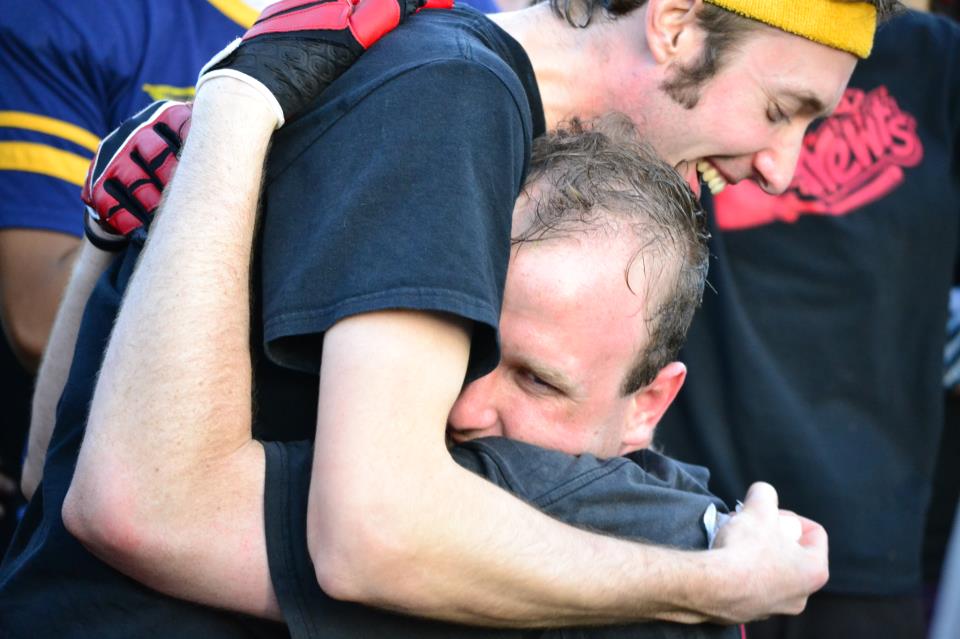

Co-captains Sam Fischgrund and Kevin Oelze of the Skrewts embrace just after their tournament win. The two combined for all 70 of their points in the final match. Credit: Laurel Haspert
Locked in a fierce, physical battle, both the Silicon Valley Skrewts and the Lost Boys heard the cheer from the crowd that could only mean one thing: the snitch had been caught, and the game was over. Twirling the snitch over his head, Skrewts seeker and co-captain Sam Fischgrund ran back onto the field, claiming the tournament winning grab, and giving the community team their first tournament title since their founding in April 2010.
Five teams showed up this past Saturday for the second Sunshine Bowl, an annual tournament located in Stanford, Calif: the host Stanford University, the Santa Barbara Blacktips, San Jose State University, Lost Boys, and Silicon Valley Skrewts. The tournament was a single round robin with no bracket play, and the Skrewts came out on top with a flawless 4-0 record. The Lost Boys, pre-tournament favorites, finished second, while the freshly-formed Santa Barbara Blacktips earned a 2-2 record and the third place spot.
With both the Skrewts and Lost Boys entering the final match of the day with perfect records, it became basically a finals match for the pair, and turned out to be by far the most physical and exciting match of the day. The game started extremely defensively, with both teams fighting off some shakiness at the start. Skrewts chaser and keeper Kevin Oelze was uncharacteristically erratic in his passing game early on, sending his passes well past the target, but the Lost Boys missed a couple of easy bludgerless oppurtunities as well before finally getting on the board first.
Soon after, chaser Greg Weber, off to a strong start in the tournament, received a second yellow card.
This left the Skrewts defensive plan in shambles, but phenomenal beating by Miles and Timbrook, along with solid keeping by Oelze kept the Skrewts in the game.
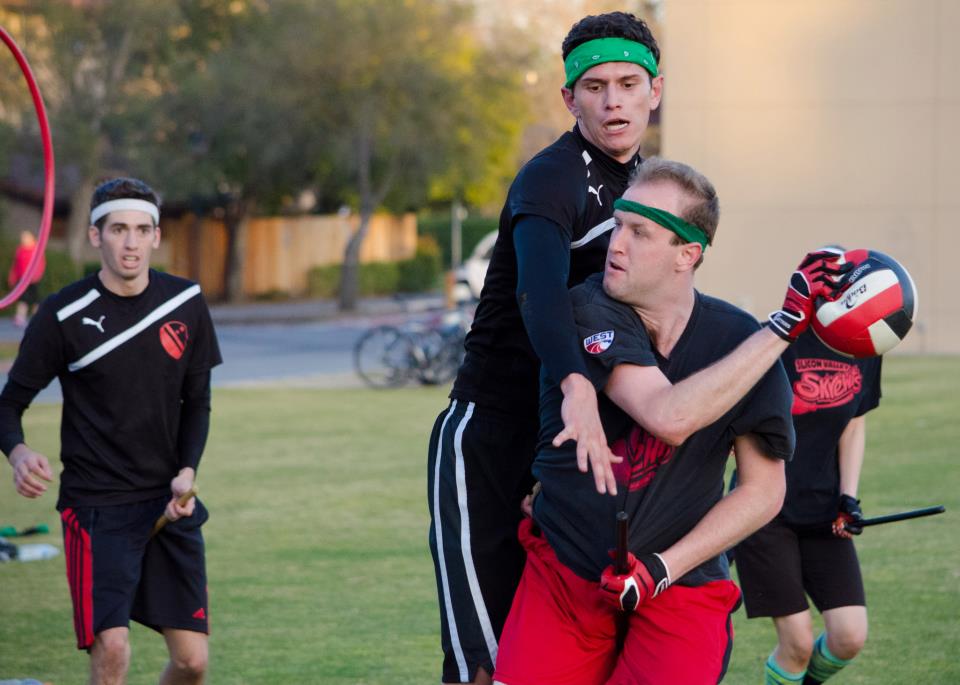
Kevin Oelze of the Skrewts fights with Tony Rodriguez of the Lost Boys near the goals, as Steve DiCarlo looks on. Credit: Kat Ignatova
The rest of the game consisted mostly of Rodriguez and Oelze trading goals, as Rodriguez was able to take advantage of the Skrewts lack of point defenders to make runs through the defense, while Miles and Timbrook were able to bring forward their bludgers offensively, helping to clear out space for Oelze. With neither team pulling ahead, the match ended abruptly on Fischgrund’s off-field pull.
With the recap out of the way, let’s take a look at what we learned about each team this weekend, and then select a team of the tournament’s top performers.
5. San Jose State University (0-4, -400)
At Western Cup III last year, San Jose exploded onto the scene, shocking the region by taking fifth place and beating the neighbor Skrewts twice in the process. While they followed that up with a mostly disappointing showing at the Cinco de Mayo Cup, momentum seemed to be in San Jose State’s favor early this year, as they started the season by beating University of California—Berkeley and narrowly lost to the Skrewts.
Unfortunately, injuries and inconsistency have played havoc with the team this season, beginning with start chaser Julian Rosenberg, who is out for the time being. At Sunshine, they also were unable to field a single female chasers, forcing them to employ a two female beater line the entire tournament. While they showcased some veteran presence from their beaters, without Rosenberg, they lacked a truly game-changing chaser, and their beaters were never able to hold bludger control consistently enough to slow down opposing offenses or offer help to their own.
However, there were some silver linings. The team has sparks of life in their chaser game from Joe Tran and Ian Newman, who usually plays beater, and will definitely expect to improve with a full roster at Western Regionals next month.
4. Stanford University (1-3, -150)
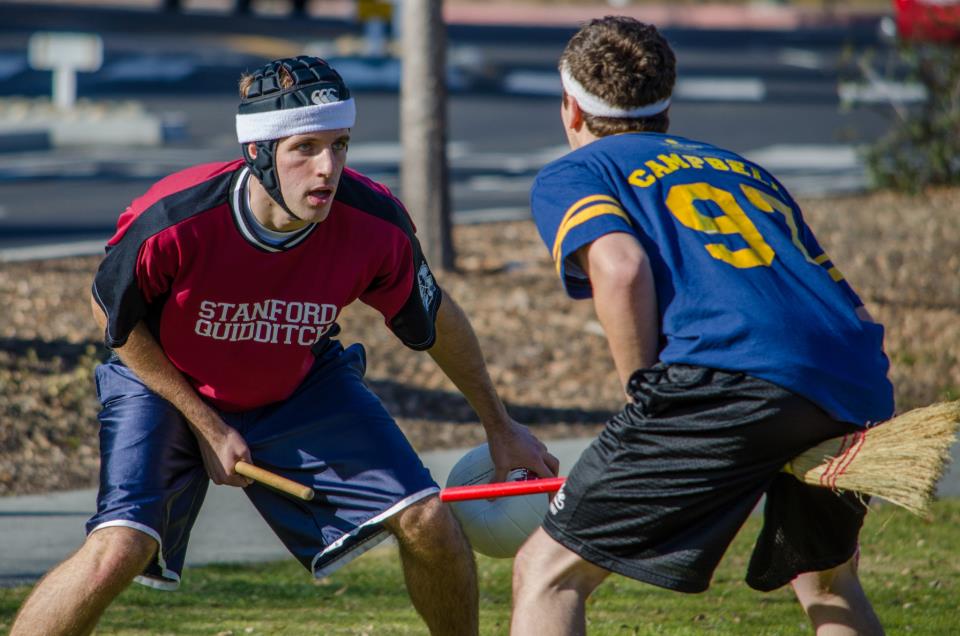
Stanford’s Francois Greer and San Jose’s Kyle Campbell face off in their game together. Credit: Kat Ignatova
Losing to the Skrewts and Lost Boys shouldn’t qualify as a disappointment for Stanford, who managed to edge out an overtime win over the Skrewts in November in an unofficial game by 10 points with two quick snitch catches and who have been consistently improving in recent months. But falling to a newer team in the Blacktips has to qualify as a disappointment for the hosts.
On the bright side, this year has seen the emergence of keeper and new co-captain David Saltzmann, who has been a nice addition to this team while greatly improving his own play since graduating from Swarthmore’s team, along with an infusion of athletic talent to the program. Still, almost all of that talent is still extremely unrefined, which can be an issue for the squad against veteran, experienced teams.
The hallmark of this team has to be their physical defense. This is a team who excels at strong point defense, and each of their chasers and keepers are willing to go in and hit the opposing carrier, using their two female beaters to mop up. Stanford held their opponents to 50 or less quaffle points in three of four games, even though they lacked bludger control for much of the day without captain and star beater Natalie Stottler, who went down injured in warm-ups..
The highlight of the tournament for Stanford was undoubtedly its controversial overtime loss to the heavily-favored Lost Boys. Stanford kept things close enough before making a pull that sent the match into extra time. A catch six seconds in seemed to have earned Stanford the wind, but it was questionably waved off for “biased snitching.”
This team has the potential to make a push for a World Cup spot at Regionals, but they’ll need to work quickly to address their weaknesses and put themselves in a position to beat teams with their athleticism.
Stanford is just coming out of nowhere this year,” Santa Barbara captain Evan Bell said. “Last year, they were struggling to find seven players, and this year, they have a shot at making the World Cup. Their defense is nearly suffocating.”
3. Santa Barbara Blacktips (2-2, -60)
The youngest team in the tournament, founded just this season, has to be happy with their showing. While they fell to the two tournament favorites, an impressive win over Stanford, who they held to just 10 points, is a sign of good things to come for the Blacktips.
This tournament served as a breakout performance for Santa Barbara chaser Michael Montgomery, who won all four of the opening runs for his team, showing natural athleticism and a strong tackling form throughout the day. He also snitched for the team on pitch.
The rest of Santa Barbara’s chaser line was athletic and played excellently in point coverage, but their defense had holes that more experienced teams were able to pass through for easy goals.
Their beater core was impressive for a young team. They generally got handled by the Skrewts and Lost Boys more experienced beaters, but they tended to hold onto the bludgers against Stanford and San Jose, which helped anchor their impressive defense.
“The Blacktips improved a lot since Snow Cup,” Stottler said. “Especially for a new team, their beaters showed great discipline and worked very well together.”
While they will need to work on their coordination, this is a squad that has an outside shot at pushing for a World Cup spot, provided they can continue to grow rapidly.
“The Blacktips have the athleticism to compete with the Skrewts and Lost Boys,” Lost Boys captain Dan Hanson said. “But they have work to do in terms of experience. Hopefully they can learn from the teams that beat them with strong passing and beating games, as those are their weaknesses.”
2. Lost Boys (3-1, +270)
The pre-tournament favorites have to be disappointed with second place, but the eighth-man squad traveled north and represented their team well, falling just a snitch grab short of a perfect record.
It was a markedly different Lost Boys that arrived in Palo Alto, thanks to the tournament debut of ex-Hollywood Harpies keeper Tony Rodriguez for his new team.
“Playing the Lost Boys a month ago was a different experience,” Stottler said. “With the addition of Tony Rodriguez, they have someone who can pass and shoot accurately at a distance. This makes the rest of their already strong chaser line even more effective.”
Rodriguez’s basketball skills translate easily to the pitch, as his strong body control and excellent footwork makes bringing him down a very difficult task. Next to Rodriguez, chaser and seeker Steve DiCarlo played his usual solid defense in addition to providing a necessary element of speed to the team.
But, for much of the day for the Lost Boys, though, was carried by their beaters. Chris Seto, formerly a chaser and keeper for Emerson, has transitioned into the beating game with tremendous success, while former-UCLA star Michael Mohlman also beat for most of the day. The pair absolutely dominated every team they came against with the exception of the Skrewts, helping them shut out San Jose State and hold all four opponents to 40 quaffle points or fewer. Seto used his quickness to help him get in position for many high-percentage beats and to get up and down the field to help out both his offense and defense, while Mohlman provided the stronger arm.
“The highly aggressive beater duo of Michael Mohlman and Chris Seto were the most impressive players of the day,” Bell said.
As a whole, the Lost Boys should feel very good about this tournament effort, being surprised more by an up-and-coming team rather than simply letting an inferior team beat them.
“I’m really proud of how well the Lost Boys performed,” DiCarlo said. “We showed up with only eight players, and the fact that we made it through four games with such a small roster is an accomplishment in itself. But more than that, we also communicated with each other well, made a few great passes and hits, and pinpointed some things we should work on before regionals.”
1. Silicon Valley Skrewts (4-0, +340)
The Skrewts rise to tournament champions surprised many people. While their improvement had been steady, such a large jump was unexpected.
“They’ve always been looked at as a team who belong in the whimsical half of quidditch rather than the competitive half, but they should be no more,” said Hanson. “They have the passing game of a team that’s been playing together for a long time, even though one of their standout players (Weber) is new to the team. They have a true veteran presence, and that deep understanding of strategy allows them to match up well, even with teams that are much more athletic.”
The Skrewts absolutely controlled every game they played – with the exception of the finals – allowing just 90 points total on the day. The team showcased an impressive vertical passing game run by Oelze, supplemented by chaser Greg Weber and keeper Craig Kaplan. They also showed an impressive amount of depth, with even second and third-line players making plays.
More than anything, this team was anchored by their fantastic beater line of Willis Miles and Kyrie Timbrook. The pair managed to hold bludger control for the vast majority of most matches, and even in the final held it for a majority of the game. Mixing the strong-armed beaters with physical chasers was a recipe for success for the squad throughout the day.
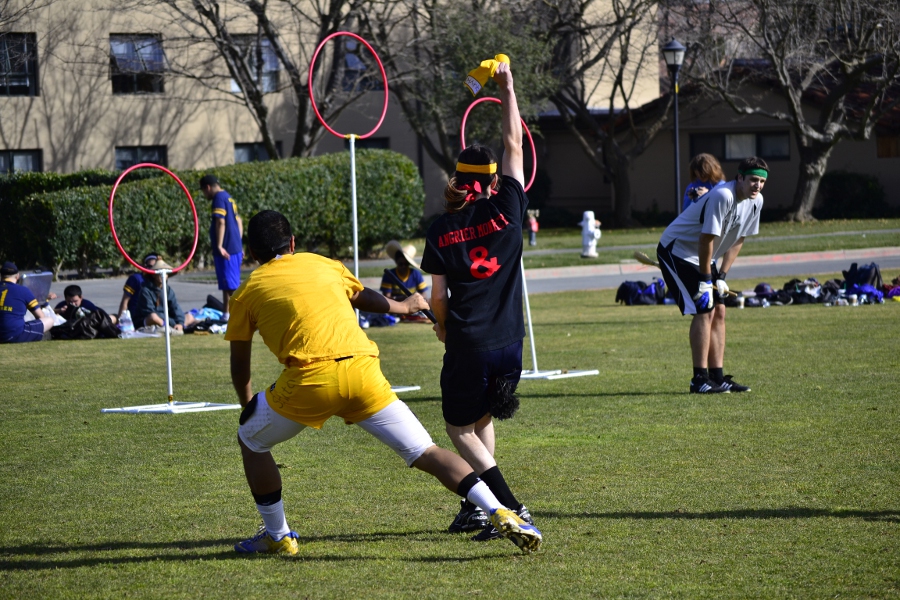
Igor Gorbatok of the Skrewts pulls the snitch in their game against Santa Barbara. Credit: Laurel Haspert
While this team is undoubtedly on the rise, they still will have a tough position a for World Cup spot in an intense Western Cup.
“The Skrewts were easily the most impressive team of the tournament,” said Bell. “Kevin has created a very well-rounded squad, especially in his beater core. The team is leaps and bounds ahead of where they were last year and could make some very serious shockwaves on the world stage.”
Hanson looks forward for the Skrewts with positive expectations, though he tempers them with potential pitfalls.
“They can be beaten by any of the other several teams on the bubble of World Cup qualification, including ASU, NAU, and Utah,” he said. “However, I dare say that the Skrewts are the 4th best team in the West and deserve a spot at the World Cup.”
All-Tournament Team
Keeper: Tony Rodriguez (Lost Boys), Honorable Mention: David Saltzmann (Stanford): The former Harpies keeper has been a great pickup for the Lost Boys, using his height and athleticism to help shut down the Skrewts’s vertical passing game in the finals, as well as being a very difficult target to take down. Rodriguez anchored the offense and defense for the Lost Boys the entire day. Saltzmann, meanwhile, has emerged as Stanford’s best quaffle player, using a surprising amount of speed and athleticism with his willingness to give hits to become the offensive and defensive star of his team.
Chasers: Kevin Oelze (Silicon Valley Skrewts), Michael Montgomery (Santa Barbara Blacktips), Amanda Nagy (Lost Boys), Honorable Mention: Steve DiCarlo (Lost Boys), Greg Weber (Silicon Valley Skrewts): Oelze spent most of the day setting up his teammates for easy goals, but in the final was able to deal with his vertical passing being shut down by making runs through the defense of the Lost Boys with his beaters to produce points. Montgomery had a standout tournament for the Blacktips team, and was generally the fastest player on the pitch anytime he was in the game. Nagy was the best female chaser at the tournament, playing very well off-ball to open up many easy scoring opportunities for the Lost Boys. DiCarlo continues to play impressive physical defense for his size, while also working effectively as both an on- and off-ball chaser on offense. Finally, Weber began making a name for himself in this tournament, working effectively off-ball with Oelze while also showing himself capable of running point. His physical defense was critical to the Skrewts all day, and the team really felt his absence in the finals.
Beaters: Willis Miles (Silicon Valley Skrewts), Kyrie Timbrook (Silicon Valley Skrewts), Honorable Mention: Chris Seto (Lost Boys): This tournament featured some outstanding beating, but it’s impossible to discuss it without starting with the pair who dominated the tournament, both through physical skill and amazing chemistry.
“By dominating the bludger game, they were the co-MVPs of the tournament in my eyes,” said Hanson.
“The Skrewts’s beater line is one of the best in the game,” Stottler added. “Miles and Kyrie are not only both excellent beaters, but they work incredibly well together. It’s nearly impossible to get – or keep – bludger advantage against them, and when they have it, they can shut down an entire offense.”
For his part, Seto was a strong match for Miles and Timbrook in the finals, making arguably the play of the tournament by tricking Timbrook into tossing her bludger back to the hoops, then beating her in a footrace to get it back to recover bludger control for the Lost Boys.
Seeker: Sam Fischgrund (Silicon Valley Skrewts), Honorable Mention: Igor Gorbatok (Silicon Valley Skrewts): These seekers combined to go 4-for-4 in snitch snatches on the day, with Fischgrund recording two off-pitch snitches, including the vital, tournament-winning pull as his team was holding on in the final match. Gorbatok, an on-pitch seeker for the Skrewts, did his part as well, registering both of his snitch catches in about 30 total seconds of field time against Santa Barbara and San Jose State.

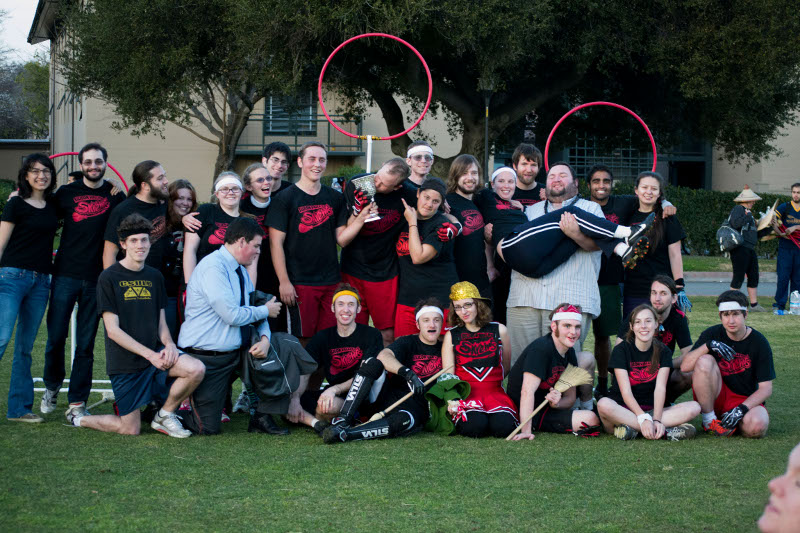
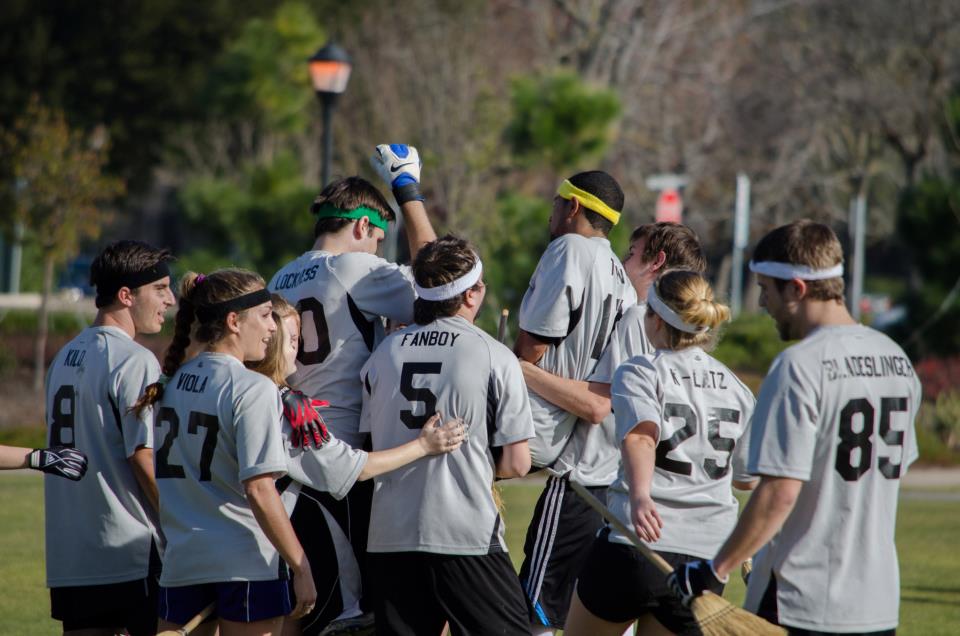
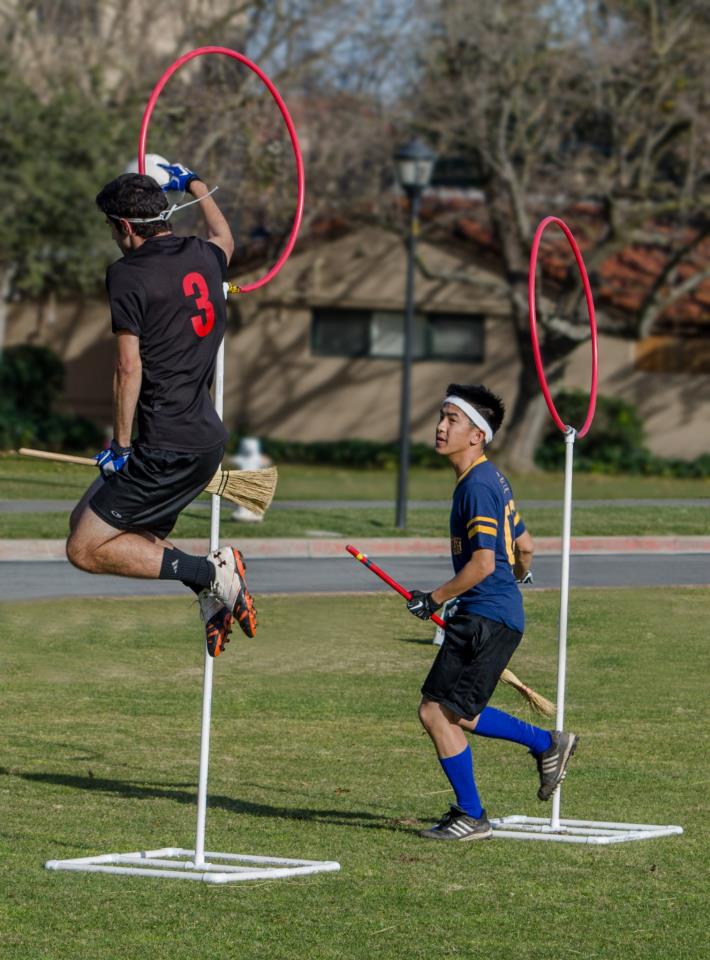
5 Comments